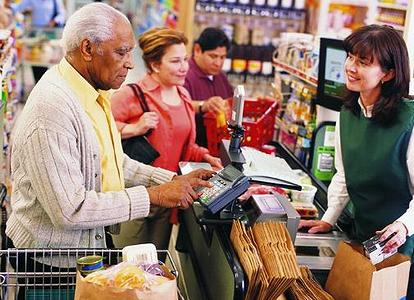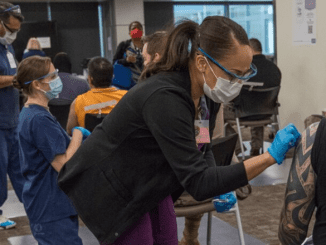
PRINCETON JUNCTION, New Jersey, March 31, 2020 (ENS) – The highly contagious, deadly novel coronavirus and the disease it causes, COVID-19, is spreading around the world in a global pandemic, raising everyone’s awareness of the need to avoid contact with frequently touched public surfaces and the need for careful hygiene practices.
Still, people must buy things – groceries, medicine, gas – and these items are paid for with debit and credit cards inserted in payment terminals. How can consumers buy what they need without getting infected?

To answer this question, the U.S. Payments Forum has developed a sheet of practical tips for a “cleaner” payment experience for merchants, ATM owners and consumers.
The U.S. Payments Forum is a cross-industry body whose membership includes: global payments networks, financial institutions, merchants, processors, acquirers, domestic debit networks, industry associations and industry suppliers.
The Forum says consumers can have a “cleaner payment experience” by making a few changes in how they pay. Here are the latest tips for consumers:
* – Clean your payment cards using soap, hand sanitizer or alcohol after each use.
* – Maintain control of your card, whenever possible, rather than handing it to the merchant.
* – If contactless payment is available, tap and pay.
* – If asked for a signature, PIN or other information at the payment terminal, use your own pen for signing or personal stylus for touchscreens.
* – If using home delivery services, pay in advance through a website, app or phone.
The Forum is also offering advice for merchants and ATM Owners on the most effective ways to clean and disinfect terminals:
* – Follow manufacturer’s guidelines to protect and care for payment terminals.
* – Use 60 percent or greater alcohol-based hand sanitizer
* – Use a card reader cleaning card. The magnetic stripe reader or chip card slot should not be cleaned with alcohol wipes or micro-fiber cloths. Use a card reader cleaning card according to the manufacturer’s guidelines.
* – Use glass cleaner or alcohol-based disinfectant wipes without bleach
* – Clean checkout and payment terminal area frequently – after each transaction if possible.
* – Consider all checkout touchpoints such as the payment terminal including the PIN pad, check lane counter and merchandise dividers, and self-checkout terminals.
* – When cleaning the terminals, do not clean the electrical connections and plugs.

* – Never spray any product directly onto the terminal. Use a cloth or wipe that has been sprayed instead.
* – Do not use solvents, detergents or abrasive products as they can damage the plastic or electrical contacts.
* – Avoid excessive wiping, which might cause damage.
* – Do not get moisture into any openings nor use aerosol sprays.
* – Refrain from using harsh and abrasive cleaners that contain strong chemicals such as bleach that may cause damage to your terminal.
Other Tips for Merchants
* – Provide sanitizing options for consumers to use in the store.
* – If inserting a card is required, when possible, let the consumers insert their own cards.
* – If you accept chips, do not require a consumer signature for payments.
* – When accepting contactless payments, consider removing or raising limits to encourage tapping. Merchants considering changes to limits for contactless payments should consult with their acquirers for potential impacts on routing and liability. Reach out to your acquirer or terminal supplier for information on how to change terminal configurations.
Please note: This information is intended solely as a convenience for its readers and does not constitute legal or medical advice, or supersede the advice, recommendations or requirements of health authorities.
Copyright Environment News Service (ENS) 2020. All rights reserved.
© 2020, Environment News Service. All rights reserved. Content may be quoted only with proper attribution and a direct link to the original article. Full reproduction is prohibited.



